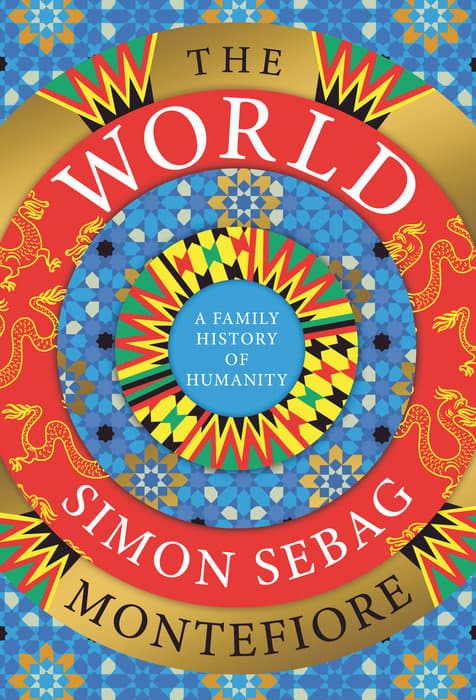
Book Review Summary: The World: A Family History of Humanity
Introduction
"The World: A Family History of Humanity" by Simon Sebag Montefiore is a comprehensive and engaging book that offers a unique perspective on human history. The author takes readers on a journey through the families that have shaped the world, from ancient times to the present day. With a focus on the personal and intimate aspects of human history, Montefiore explores the lives of influential figures and their impact on society. In this article, we will delve into the book's analysis, reasons for recommendation, and reasons for not recommending it.
About Simon Sebag Montefiore
Simon Sebag Montefiore is an acclaimed historian and author known for his extensive research and storytelling abilities. He has written several books on historical figures and events, including "The Romanovs" and "Jerusalem: The Biography." His works have been widely praised for their accessibility and ability to bring history to life. With his latest book, "The World," Montefiore continues to captivate readers with his storytelling prowess and deep understanding of human history.
Analysis of Views
- Comprehensive Overview: Readers praise the book for its comprehensive coverage of human history. From ancient civilizations to modern times, Montefiore provides a wide-ranging perspective on the families that have influenced the world. The book covers various cultures, continents, and historical events, offering a well-rounded understanding of human history.
- Engaging Storytelling: Many readers appreciate Montefiore's storytelling style, which makes the book engaging and accessible. The author weaves together personal stories and historical events to create a compelling narrative that captures the reader's attention. The book's focus on families adds a personal touch, making it relatable and enjoyable.
- Dense and Detailed: While some readers find the book's length daunting, others appreciate its depth and detail. With over 1300 pages, "The World" covers a vast amount of information, providing readers with a comprehensive understanding of human history. However, the density of the book can make it challenging to read, requiring patience and dedication from readers.
- Balance of Families and Dynasties: Montefiore's choice to frame the book around families and dynasties is commended by readers. The author highlights the significance of these groups in shaping human history, providing a unique lens through which to view events. By focusing on interconnected families, Montefiore offers a more intimate perspective on the world's past.
- Ambitious but Overwhelming: Some readers find the book's ambition admirable but feel overwhelmed by its length and density. While they appreciate the comprehensive coverage of human history, they struggle to absorb all the information presented. The book's extensive scope can make it challenging for readers to fully engage with the material.
Reasons for Recommendation
- Comprehensive Coverage: "The World: A Family History of Humanity" offers a comprehensive overview of human history, making it an excellent resource for those interested in exploring the world's past. The book covers a wide range of cultures, civilizations, and historical events, providing readers with a well-rounded understanding of human history.
- Engaging Storytelling: Montefiore's storytelling style captivates readers, making the book enjoyable and accessible. The personal stories he presents bring history to life, making it relatable and engaging for readers of all backgrounds.
- Unique Perspective: By framing the book around families and dynasties, Montefiore offers a unique perspective on human history. This approach highlights the significance of these groups in shaping the world and provides readers with a more intimate understanding of the past.
- Accessible Writing: Montefiore's writing style is praised for its accessibility, making complex historical events and figures easy to understand. His ability to convey historical information in an engaging manner makes "The World" accessible to readers with varying levels of knowledge about history.
- In-Depth Research: Montefiore's extensive research shines through in "The World," making it a highly credible and informative resource. The book is based on extensive primary sources and scholarly research, providing readers with a reliable and accurate account of human history.
Reasons for Not Recommending
- Density and Length: Some readers find the book's length daunting and feel overwhelmed by its density. The extensive coverage of human history can make it challenging to read and require significant time commitment from readers. For those seeking a more concise exploration of history, this aspect may be a drawback.
- Overwhelming Information: The book's extensive scope can make it challenging for readers to fully engage with all the information presented. With so much material covered, some readers may feel overwhelmed or struggle to absorb all the details, making it difficult to fully appreciate the book's content.
- Eurocentric Focus: Some readers feel that "The World" has a Eurocentric bias, focusing primarily on European families and dynasties while neglecting other regions of the world. While Montefiore does cover other civilizations and cultures, some feel that their significance is underrepresented or not given sufficient attention.
- Lack of Contextualization: Some readers find that Montefiore's narrative lacks sufficient contextualization, making it difficult to fully understand the historical events and figures discussed. While he provides background information, some feel that more context would enhance their understanding of the material.
- Limited Focus on Women: Some readers express disappointment that Montefiore places less emphasis on women's contributions to human history in "The World." While he acknowledges their significance, some feel that their contributions are not given sufficient attention or recognition within the narrative.
Conclusion
"The World: A Family History of Humanity" by Simon Sebag Montefiore is a comprehensive and engaging exploration of human history through the lens of families and dynasties. While some readers find the book's length daunting and struggle with its density, others appreciate its comprehensive coverage and unique perspective on world history. Montefiore's storytelling style captivates readers, making complex historical events accessible and relatable. However, some criticisms include the Eurocentric focus, limited contextualization, and lack of attention given to women's contributions to history. Overall, "The World" offers a valuable resource for those interested in exploring human history from an intimate and personal perspective.